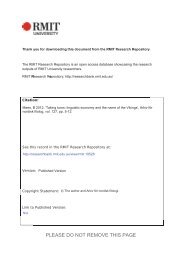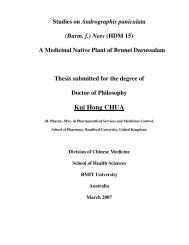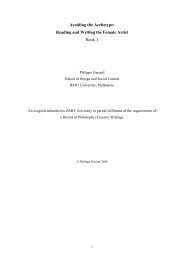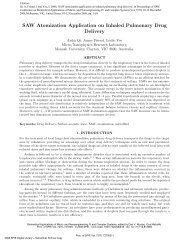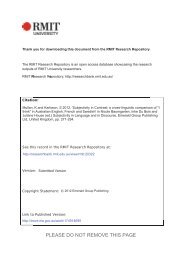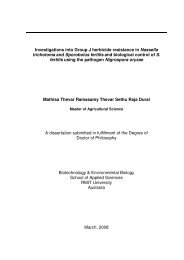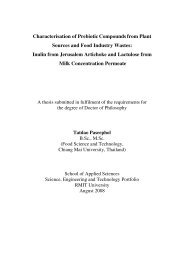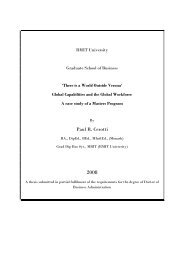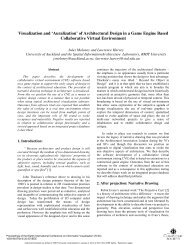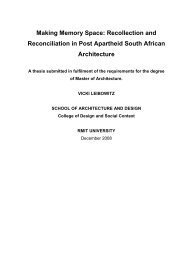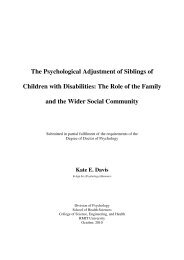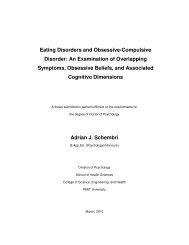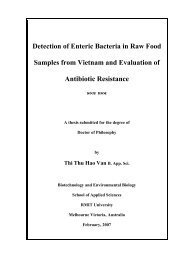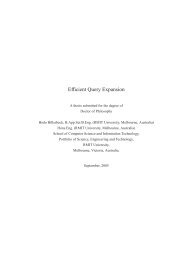Objects in Flux - RMIT Research Repository - RMIT University
Objects in Flux - RMIT Research Repository - RMIT University
Objects in Flux - RMIT Research Repository - RMIT University
You also want an ePaper? Increase the reach of your titles
YUMPU automatically turns print PDFs into web optimized ePapers that Google loves.
<strong>Objects</strong> <strong>in</strong> <strong>Flux</strong><br />
134<br />
<strong>in</strong> material and social form. In produc<strong>in</strong>g parallel narratives of use<br />
consumers open the discursive space of the object to a multiplicity of<br />
voices and a diverse array of social mean<strong>in</strong>gs.<br />
7.5 Reth<strong>in</strong>k<strong>in</strong>g the object as public space<br />
Where the commercial economy has traditionally isolated the <strong>in</strong>dividual<br />
with<strong>in</strong> private acts of consumption, newly emergent networked<br />
practices remake acts of consumption as a communal endeavor. As<br />
John Seely Brown states: ‘T<strong>in</strong>ker<strong>in</strong>g is no longer an isolated activity<br />
you do <strong>in</strong> your garage. You’re t<strong>in</strong>ker<strong>in</strong>g with a community platform,<br />
you’re t<strong>in</strong>ker<strong>in</strong>g with other people’s stuff’ (quoted <strong>in</strong> Lessig, 2004, p.<br />
46). In contemporary society, the privately consumed mass-produced<br />
object becomes a distributed common ground, a sphere of action<br />
where people gather to discuss matters of collective concern. This<br />
site is provisional, <strong>in</strong> that it is given through the meet<strong>in</strong>g of <strong>in</strong>dividuals<br />
and the discursive field that arises from this meet<strong>in</strong>g. What is<br />
important here are not the material outcomes of the discussion but the<br />
process of engagement – the ability for <strong>in</strong>dividuals to jo<strong>in</strong> <strong>in</strong> conversation<br />
and exercise their powers of agency. If we were to conceive of the<br />
mass-produced object as a distributed public realm, a polis or form of<br />
public space, then we may ask: What limits should be placed on this<br />
space, who should be allowed to determ<strong>in</strong>e the conversations that take<br />
place here, and what freedoms are we will<strong>in</strong>g to give up for the sake<br />
of economic returns?<br />
The public is only beg<strong>in</strong>n<strong>in</strong>g to understand how much has been lost to<br />
the <strong>in</strong>creased privatization of the consumer environment. Laws such<br />
as the Digital Millennium Copyright Act, and the anti-circumvention<br />
measures given with<strong>in</strong> this act, br<strong>in</strong>g an unprecedented level of control<br />
to consumer society. If we wish to reta<strong>in</strong> relevance and participation <strong>in</strong><br />
public discourse then we need to ensure public spaces, wherever they<br />
may arise, do not disappear <strong>in</strong>to private ownership.<br />
7.6 Gaps <strong>in</strong> the research and future directions<br />
In adopt<strong>in</strong>g a participatory approach to this research I was able to<br />
conduct a highly detailed study of the field of object modification. My<br />
pre-exist<strong>in</strong>g knowledge of practices of hack<strong>in</strong>g and modd<strong>in</strong>g, <strong>in</strong>clud<strong>in</strong>g<br />
a familiarity with computers and electronics, helped to reduce the<br />
barriers to my participation and allowed for a deep understand<strong>in</strong>g of



